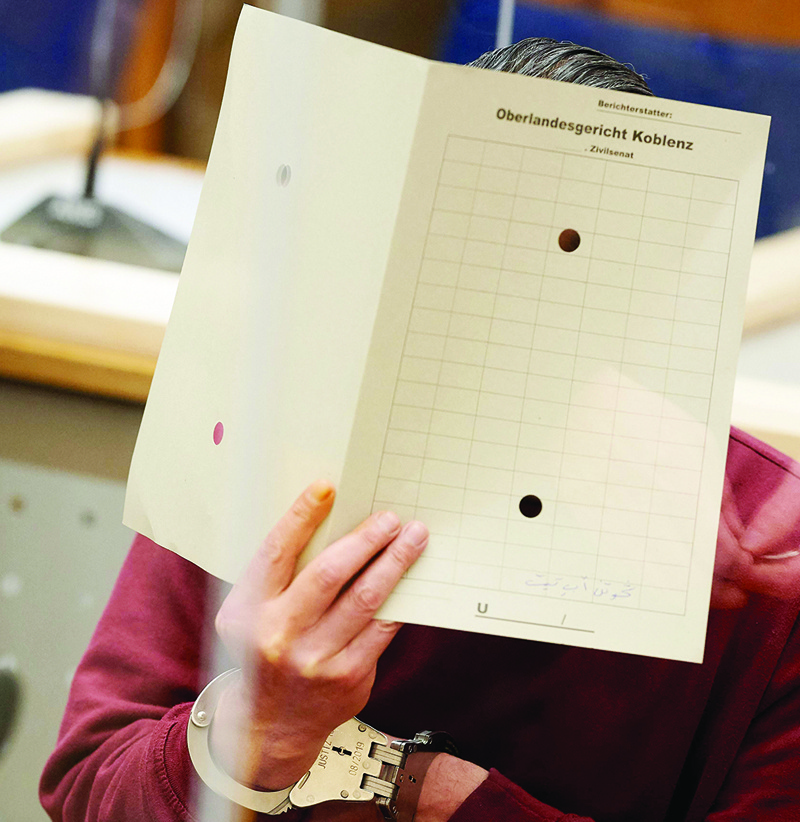 Eyad Al-Gharib
Eyad Al-GharibKOBLENZ/CELLE, Germany: A German court yesterday convicted a former Syrian intelligence service agent for complicity in crimes against humanity, in the first court case worldwide over state-sponsored torture by Syrian President Bashar Al-Assad's government. Eyad Al-Gharib, 44, was sentenced to four and a half years in prison over his role in helping to arrest at least 30 protesters and deliver them to the Al-Khatib detention center in Damascus after a rally in Duma in autumn 2011.
Almost 10 years since the Arab Spring reached Syria on March 15, 2011, the judgment is the first in the world related to what judge Anne Kerber called "widespread and systematic repression" of protesters by the regime in Damascus. The conviction was hailed as a "ray of hope" by Syrian Wassim Mukdad, a plaintiff who suffered torture in the Al-Khatib center, also named "Branch 251". "This is just the beginning and the day will come when Bashar Al-Assad and his cronies, the army and intelligence generals are put on trial," said Mukdad, who testified at the trial.
Gharib, a former low-ranking member of the intelligence service, hid his face from the cameras with a folder as the verdict was read out, arms folded and wearing a medical mask. He is the first of two defendants on trial since April 23 to be convicted by the court in Koblenz, after judges decided to split the proceedings in two. The second defendant, Anwar Raslan, 58, is accused directly of crimes against humanity, including overseeing the murder of 58 people and the torture of 4,000 others.
 Ahmad Abdullah
Ahmad AbdullahPatrick Kroker, a lawyer representing the joint plaintiffs, said Assad's name was read out "at least five times during the verdict", while prosecutor Jasper Klinge saw the proceedings as "a signal to the perpetrators" of mass crimes in Syria. Prosecutors in Koblenz had been seeking five and a half years for Gharib, who defected in 2012 before finally fleeing Syria in Feb 2013.
After spending time in Turkey and then Greece, Gharib arrived in Germany on April 25, 2018. During the trial, Gharib wrote a letter expressing sorrow for the victims. He also wept as his lawyers called for his acquittal, arguing that he and his family could have been killed if he had not carried out the orders of the regime. But the court argued that he "knew that torture was being practiced" in the detention center, even if he himself had not beaten protesters.
The trial marked the first time that photos from the so-called Caesar files were presented in a court of law. The 50,000 images taken by Syrian military police defector "Caesar" show the corpses of 6,786 Syrians who had been starved or tortured to death inside the Assad regime's detention centers.
Separately, a notorious Iraqi preacher said to be the Islamic State jihadist group's de facto leader in Germany was sentenced to 10 years and six months in prison by a German court yesterday. The 37-year-old Ahmad Abdulaziz Abdullah Abdullah, better known as Abu Walaa, helped radicalize young people in Europe and helped them travel to Iraq and Syria, the court found.
He was found guilty of belonging to a foreign terrorist organization, helping to plan subversive violent acts and financing terrorism. Handing down the verdict after 245 days of hearings, judge Frank Rosenow said Abu Walaa was "authorized to act in the name of IS" and was used by the jihadist group as its "representative in Germany" for propaganda and recruitment.
The Iraqi preacher was in the dock with three other men in a costly, high-security trial that began in 2017 in the northern German town of Celle. His three co-defendants were handed sentences ranging from four to eight years for supporting IS. Prosecutors had sought a prison sentence of 11 and a half years for Abu Walaa, while the defense had argued for an acquittal and criticized key witness testimonies.
Abu Walaa arrived in Germany as an asylum seeker in 2001, and was arrested in Nov 2016 after a long investigation by Germany's security services. Based in a mosque in the northern city of Hildesheim, he is alleged to have recruited at least eight jihadists - most of them "very young" - to IS, including German twin brothers who committed a bloody suicide attack in Iraq in 2015. Dubbed the "preacher without a face" for his online videos in which he always appeared with his back to the camera, he is also alleged to have preached jihad at the now-closed Hildesheim mosque.
The charge against the Iraqi preacher is largely based on the testimony of a security service informant who spent months collecting evidence. The informant was exempted from testifying in person before the court over fears that it would put his life in danger. Another key informer was a disillusioned jihadist who agreed to cooperate after returning to Germany from IS-controlled territory, and told investigators how he had been part of Abu Walaa's network before travelling to Syria. Yet Abu Walaa's lawyer Peter Krieger insisted that these testimonies were untrustworthy, telling the court that the key witness was a "notorious liar". - AFP










